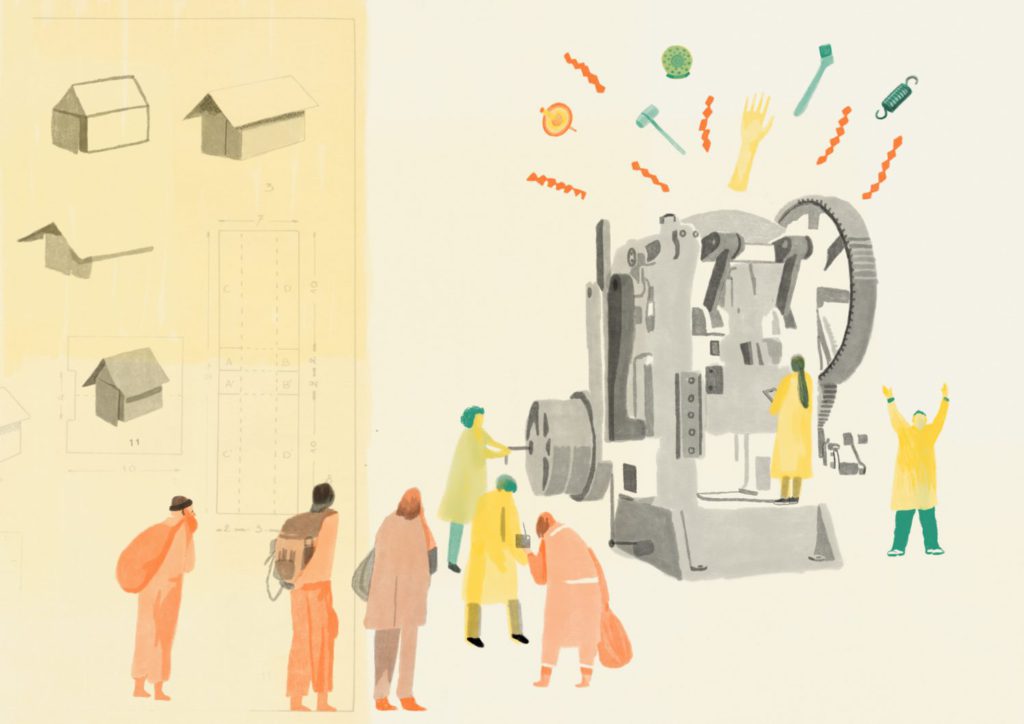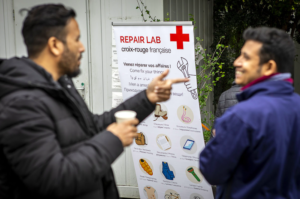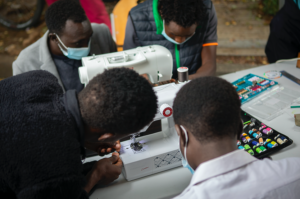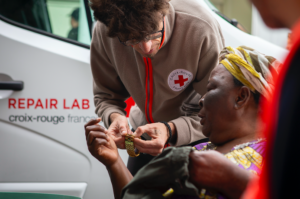
The repair lab - Pau Gasol
Description
The itinerant Humanitarian Repair Lab is a mobile repair workshop run by a team of volunteers in informal living spaces. This initiative enables refugees, migrants and people in vulnerable situation to repair their personal belongings themselves.
Context
This pilot project responds to answer to three needs identified in the field by the French Red Cross in its supports activities for exiles:
- People in exile, but also in wandering situations, are faced with a deterioration of their personal belongings due to the difficult conditions in which they survive.
- They are also placed in a situation of dependance on humanitarian actors, which can contribute to a feeling of derealisation and dehumanisation.
- The lack of prospects, and endless waiting due to complex administrative situations often lead to mental health problems.
To answer these three challenges, the French Red Cross has launched the design of a new type of Humanitarian Service Point: the first mobile humanitarian repair laboratory. The aim is to make exiled and/or homeless people active players in meeting their needs, with two objectives :
- The Repair Lab gives them the opportunity to repair personnel objects affected by their living condition themselves, thanks to access to repair workshops and supervision by volunteer peers who provide tools, materials and machines (textiles, electronics, mechanics…)
- The Repair Lab also offers activities aimed at strengthening their psychosocial skills and improving their mental health and self-esteem, through outreach services, listenings systems and counselling or creative activities.
The ability to repair personal belongings is a way, for beneficiaries, to protect their dignity. Walking with broken shoes, losing a phone number that disappears because it was written on a piece of paper soaked in the rain, being unable to charge your phone due to a severed cable, or being cold due to torn clothes or a punctured down are common occurrences in the places where the Itinerant Humanitarian Repair Lab is involved. These items could easily be repaired. The Repair Lab provides the resources, technical support and location to do this.

Technical details & Operations
Four Repair Lab formats have been developed and tested, depending on the capabilities of the local teams and the context of the operation:
- For the largest open-air sites, a fully equipped 20m3 custom-built truck
- For the hardest-to-reach locations, an electric bike-powered work cart
- More traditional, light vehicles with repair equipment loaded in the boot
- A lightweight version, a first-aid rucksack converted into a marauding repair rucksack with tools and breakdown equipment.
The experiment was made possible thanks to financial support from the French Red Cross and Red Crescent Federation. In France, the Repair Lab is currently active or in the process of being launched in 3 different areas (Hérault, Rhône and Hauts de France), with an average of 2 to 3 deployments per week throughout the year.
During each deployment (on average ½ day), the intervention teams (min 3-4 volunteers) work mainly with exiles in transit and homeless people, offering the following activities:
Manual repair and personalisation activities in various fields
- Textiles (e.g. zips, rucksacks, clothes, shoes, etc.),
- Electronics (lamps, headphones, mobile phones, etc.),
- Mechanics (bicycles, toys, etc.)
- Document protection (e.g. copying, laminating, scanning, etc.),
Welcome, listening and guidance services with
- Tea/coffee and biscuits
- Discussion area;
- Information on rights and local social initiatives.
One of the fundamental principles of intervention is “doing with” and not “doing for”. By placing the beneficiaries at the centre of the action, they help to build a horizontal relationship and foster resilience throughout the migration process. They often receive feedback that beneficiaries feel proud and happy to have done what they had to do themselves.
The project leaders are constantly on the lookout for “relay points”, which are usually partner associations in the towns where the Repair Lab is active, to ensure that the people they meet know where they can repair their personal belongings, without relying solely on the Repair Lab. In this way, after a roll-out, the people they meet are informed of the existence of other secure spaces where they can meet their needs themselves.

Deployment & Impact
In 2023, the year in which the system will be tested :
- More than 1.000 person, of 20 nationalities, have taken part in Repair Lab activities
- More than 60 volunteers have organised and run nearly 80 deployments in Hérault and Rhône départements and Hauts de France regions.
Above and beyond these figures, it’s the anecdote that bear witness to the moments shared. They are many collective moments and stories, and each one counts
Among many objects repaired, we can mentioned some of them :
- A little Romanian boy who left the Repair Lab with his repaired polystyrene toy plane and a big smile on his face. His whole family waited while he, and the team of volunteers, repaired it. The whole family knew how important it was to him.
- An asylum seeker, formerly a volunteer with the Malian Red Cross, who urgently needed to sew up his qamis to go and pray at the mosque.
- A young Guatemalan who left his country with his coffee pot, which was leaking but brought back precious memories.
- A nigerian footballer, while repairing a sports boot, asked how he could take up his profession in France and get closer to local clubs
- Very often, people of different nationalities help each other with repairs. One morning like any other, while breakfast was being distributed in a day centre, 5 people of 5 different nationalities queued up to help a sixth repair her broken zip.
The impact of the project is also, and above all, the discussions, life stories, confidences and requests for help and referrals to other social actors that emerge from a break over a cup of chicory, between two repairs. It’s the feedback from people who say how happy they are to be considered, or how good the music makes them feel.
It’s the people who look forward to the Repair Lab arriving week after week. They are also participants who ask to join the intervention team to help others and continue to get involved alongside us.
The travelling Humanitarian Repair Lab is now entering a phase of expansion. To support teams from the Red Cross and Red Crescent Movement, as well as other solidarity players, they have developed an open date toolbox that is available on request.
Testimonials
“Thank you to the French Red Cross, I repaired my phone thanks to you” (Karamoko, passing by to have a breakfast in a day centre)
“Being able to sew my bras back on, is important. A bit of feminism in this brutal world” (Anne, currently homeless)
“I left Guatemala with this coffee pot, it’s very important to me” (Sergio, asylum seeker)






